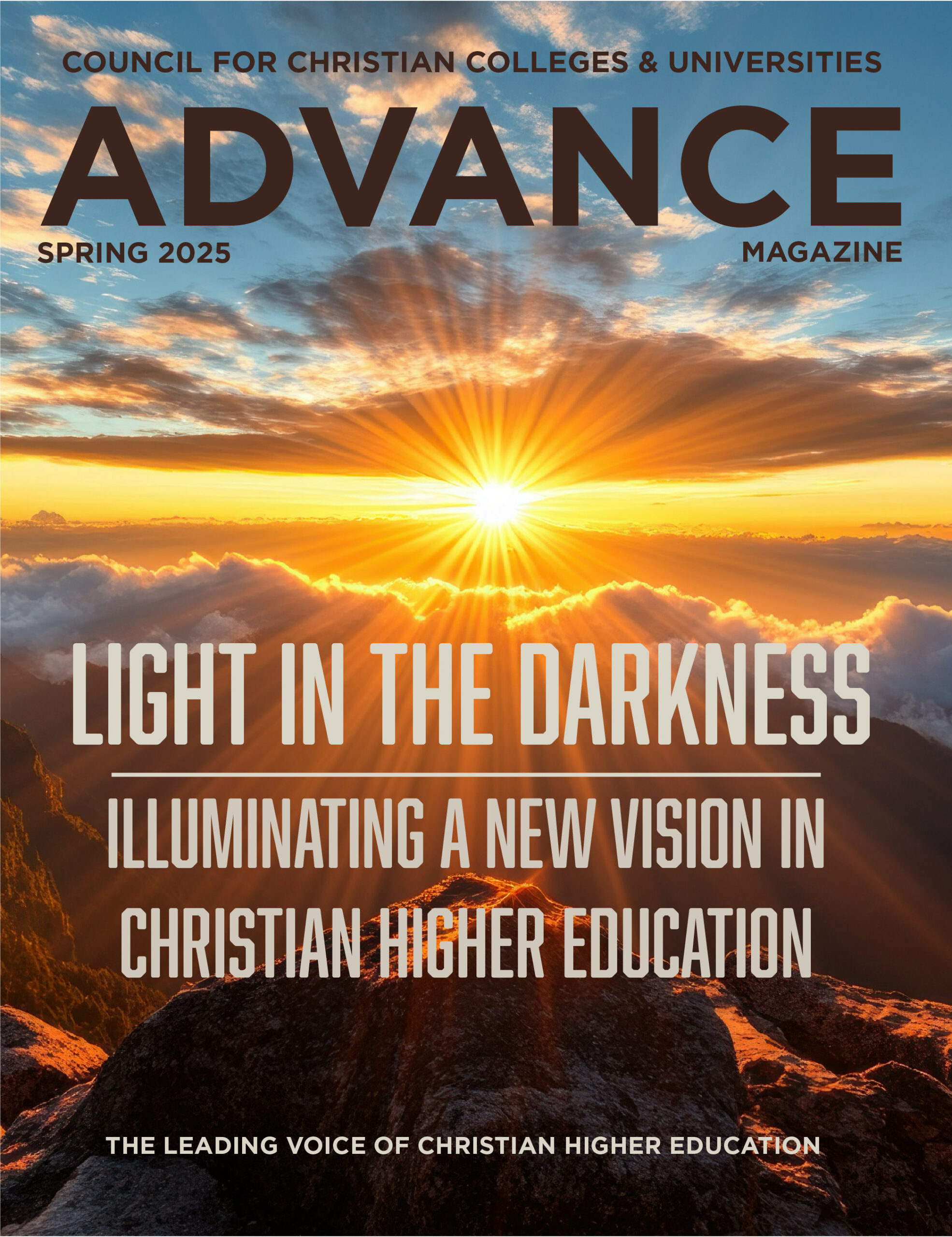Magazine
For more than 50 years, America’s colleges and universities have been governed by various iterations of the Higher Education Act (HEA). First passed in 1965 as part of President Lyndon B. Johnson’s vision for a Great Society, the HEA’s original goals were “to strengthen the educational resources of our colleges and universities and to provide financial assistance for students in postsecondary and higher education.” It has since been reauthorized eight times and grown in both length and complexity, with new elements being added or modified to reflect trends in society and in higher education. As of the 2008 reauthorization, there were 432 pages and 11 titles, up from just 52 pages and six titles in 1965.
It has been nine years since the HEA was last reauthorized in 2008. While basic provisions have been temporarily extended for the past few years as a stopgap measure, this legislation is overdue for a comprehensive reauthorization. In this era of political partisanship, the 115th Congress (January 2017- 2019) represents the best opportunity for this outcome as both houses of Congress and the presidency are controlled by the same political party. Furthermore, the chairs of the relevant committees – Sen. Lamar Alexander (R-TN) on the Senate Health, Education, Labor, and Pensions (HELP) committee and Rep. Virginia Foxx (R-NC) on the House Committee on Education and the Workforce – are both former presidents of institutions of higher education and have listed the HEA’s reauthorization among their top legislative priorities.
The HEA reauthorization could be a straightforward reauthorization with relatively few dramatic changes, or it could fundamentally change the landscape of higher education. Some, like Secretary of Education Betsy DeVos, have previously suggested doing away with the HEA and starting fresh. However, reauthorization, much less replacement, has already been difficult enough, and these committees have other pressing legislative priorities because of their broad purview. For example, the Senate’s HELP committee handles both education and healthcare, the latter of which has occupied much of its time and attention throughout 2017. Given this, a complete replacement seems unlikely, but anything is possible.
As with most legislation, there are numerous stakeholders and a wide variety of issues, which weave together to create complex dynamics. Here are four key issues that are the subject of significant debates:
What programs should be eligible for federal funding? While the peer-review accreditation system has a long history that predates the HEA and has played a vital role in ensuring academic and institutional quality, some argue that the current accreditation system allows a virtual monopoly that stifles innovation. Because institutions must be accredited by federally recognized accreditors in order to receive federal student aid, accreditors have a tremendous amount of influence over institutions – and an incentive to be very conservative when it comes to change. For example, businesses like Boeing have been frustrated because they are unable to offer their own stand-alone programs since participants would not qualify for federal aid. Instead, they have had to resort to partnerships with existing institutions like the University of Washington. On the other hand, others point out that not just any program should be eligible for federal funding. The question of balancing accreditation’s function of ensuring educational standards with innovation is one many lawmakers wish to address.
How much control should the government have over accreditors? While accreditors have a lot of power over institutions, the federal government’s National Advisory Committee on Institutional Quality and Integrity (NACIQI) has significant power over accreditors. It determines which accrediting agencies should be recognized by the U.S. Department of Education – and thus determines the accreditation options available to institutions. Since NACIQI’s establishment in 1992, the government has been able to use this leverage over accrediting agencies to shape higher education in the United States. NACIQI’s 18 members have experience in higher education, but the formation of the board is itself inherently political: the Secretary of Education picks six, the speaker of the house picks six (three selected by each party’s leader), and the Senate’s president pro tempore picks six (three selected by each party’s leader). The United States’ higher education institutions predate accreditation (and some even predate the federal government), and accreditation predates the HEA. Yet, through its funding of higher education, the federal government has increasingly exerted greater control over higher education institutions through accreditation. Whether the HEA will further expand this federal control remains to be seen.
What level of student outcome data should be collected and available? There have been discussions on reversing the federal ban on student-level data and assigning each student a federal ID number that would allow the government to track their educational and professional outcomes. Proponents argue that collecting and disseminating anonymized data about specific student outcomes would provide greater transparency, as well as assist prospective students in determining which institutions would best serve their specific needs. Opponents argue that such detailed data would be a significant privacy concern.
How should institutions and accreditors credit experience? Defenders of competency-based education suggest they simply recognize skills that students already possess with academic credit. If a student can demonstrate proficiency, why require them to take and pay for a course just to learn what they already know? After all, almost 3,000 institutions accept the College-Level Examination Program (CLEP), which allows students to demonstrate knowledge acquired through previous study or experience by examination. Furthermore, proponents say that such competency-based education could encourage students to pursue higher education who might otherwise have been unable to due to the time and costs involved. However, detractors of competency-based education note that the credits involved can be substantial, with some programs granting up to two years of credits for past experience. They worry that such policies can appear to be oriented at padding enrollment and bottom lines rather than ensuring a quality education.
Christian institutions of higher education are in a unique position in that they have many concerns that are similar to other institutions, but also have additional concerns as faith-based organizations. Put another way, Christian colleges are both Christian and colleges, with unique needs and concerns derived from each fundamental characteristic.
In the lead-up to the HEA’s reauthorization, the CCCU has ramped up its efforts to communicate the perspectives of its members and the nature of Christian higher education to both Capitol Hill and the Department of Education. In addition to issues broadly affecting higher education, some topics of particular interest to Christian higher education that are likely to be included in the HEA reauthorization are accreditation and financial aid in relation to Title IV and regulatory burdens and religious freedom protections in relation to Title IX.
Title IV, Accreditation, and Financial Assistance
Among other original priorities of HEA, the federal government wanted to provide guidelines for federal financial assistance. Title IV of the HEA creates the mechanism whereby students receive Pell grants, other opportunity grants, loans, and other forms of assistance to aid in paying for college. Students receiving these types of aid are able to take them to the institution of their choice so long as the institution participates in Title IV programs. This title also includes the mandate for the Free Application for Federal Student Aid (FAFSA) to help allocate federal student aid according to need.
Recent federal and state laws and regulations have targeted some religious institutions specifically due to how they live out their mission and beliefs in areas like hiring or student conduct. This targeting extends to accreditation. One of the characteristics of all CCCU U.S.-based member institutions is that they are accredited by federally recognized accreditation agencies. Because such accreditation is required for an institution’s students to receive federal aid, and because nearly all CCCU schools participate in federal aid programs, accreditation issues are existential issues.
The strong connection between accreditation and Title IV assistance programs is a concern for religious institutions. Accreditors have already threatened some religious institutions with withdrawal of accreditation due to practices like hiring based on religion or enforcing behavior codes that include religiously based expectations of individual and social conduct. If schools lost accreditation, a large percentage of students attending CCCU institutions would no longer be able to attend the college or university of their choosing, mainly because of the resulting loss of financial aid.
Congress explicitly stated in the 2008 HEA reauthorization that all federally recognized accreditors must respect the mission of religious colleges and universities. Yet despite this clear mandate, the term “religious mission” is undefined, leaving its scope subject to the opinion of each accrediting team. With the upcoming HEA reauthorization, Congress has the opportunity to reaffirm its desire for institutions, secular and religious alike, to be able to operate faithful to their mission, and to remove ambiguity from the term “religious mission.” This way, accrediting bodies will better understand that religious institutions ought not be discriminated against for their religious beliefs.
The religious missions of CCCU institutions are central to each institution; many students choose them not despite these missions, but because of them. We believe that students – not accreditors – are best able to choose the college or university that suits their needs, and we believe that accreditors should not de facto limit students’ options because of an institution’s religious beliefs and standards. We are committed to supporting policies that promote complete student choice in the use of federal student aid. Our goal at the CCCU is to provide continued assurance that Christian students who wish to attend a religious higher educational institution are fully eligible, on the same basis as other students, for all types of Title IV student assistance, whether grants, loans, work study, or any other type of assistance.
Title IX, Regulatory Burdens, and Religious Freedom
Developed in 1972 as a federal civil rights law, Title IX was originally added to the HEA to prevent discrimination based on sex in intercollegiate athletics. Discrimination is now defined to include sexual harassment and violence, which includes sexual assault, rape, sexual coercion, and battery. While Title IX remains best known for broadening opportunities for women in college and university athletics, its power ranges much more broadly in requiring equal opportunities for the two sexes in every aspect of higher education.
The Department of Education’s April 2011 “Dear Colleague” letter on sexual violence served as a sea change in higher education in terms of how the Department would handle Title IX complaints going forward. The increase in societal concern and awareness highlighted in the 19-page letter required institutions to take very specific steps in response to allegations of sexual harassment and violence on campus. Since the release of the “Dear Colleague” letter, the Department of Education has widely applied the same regulations across institutions of higher education, regardless of size, mission, or record.
While the CCCU supports the government using regulations to protect individuals from sexual harassment and violence, we believe that regulations should reflect the input of those within the higher education community. Current regulations do not account for small institutions or those with lower rates of incidents, as is the case for most CCCU institutions. As things stand, the regulatory burden of Title IX compliance is disproportionately high compared to both the size and safety of our member institutions. The CCCU has advocated for policy changes that recognize that some of our campuses struggle to provide the resources necessary to uphold the current regulations. For this reason, we were heartened when Secretary DeVos announced on Sept. 7, 2017, that “the era of ‘rule by letter’ is over” and that the Department of Education would start a notice-and-comment period to seek input from the higher education community, among others, on the enforcement of Title IX.
Another Title IX issue relevant to the CCCU is the process of exemption. Title IX currently states that institutions “controlled by” a religious organization are exempt from requirements that are in conflict with its religious convictions. Exemptions made through Title IX have protected the hiring practices of Christian institutions of higher education, beliefs about abortion, single-gender programs or classes, and, more recently, religious beliefs on gender identity. Yet the standard practice thus far has been that most schools request an exemption from the Department of Education, even though the legislative text already says they are exempt. Recently, this process has made CCCU institutions vulnerable for public shaming as they have applied for exemptions that the law already categorically provides.
Additionally, because only private colleges or universities that are “controlled by” a specific religious organization can submit requests for Title IX exemptions per existing regulations, institutions that are driven by a biblical creed or confession rather than a denomination are in a difficult position. This can create significant delays in approval for religious exemptions. In short, there are flaws in both who qualifies and how they qualify.
The CCCU advocates to both Congress and the Department of Education that the process of exemption should be updated. Statutorily, institutions who are exempt in law need not “pre-qualify.” The process should be revised to reflect this. While this provision is not part of the Higher Education Act itself, it is a matter that the CCCU is working with the relevant officials to address.
Conclusion
The CCCU’s goal is to ensure that reauthorization of the HEA by the 115th Congress – and any regulations promulgated by the Department of Education under the Trump Administration – fully recognizes the distinctive contributions of CCCU schools and their graduates. To that end, we work collaboratively with others in the higher education and religious freedom communities in making the case for the important and constructive role that religious colleges play in the higher education landscape.
Alana Dean contributed to this report.
Brad Crofford is the CCCU’s legislative assistant. He is an alumnus of BestSemester’s American Studies Program and holds a B.A./B.S. from Southern Nazarene University and a master’s in international studies from the University of Oklahoma.




